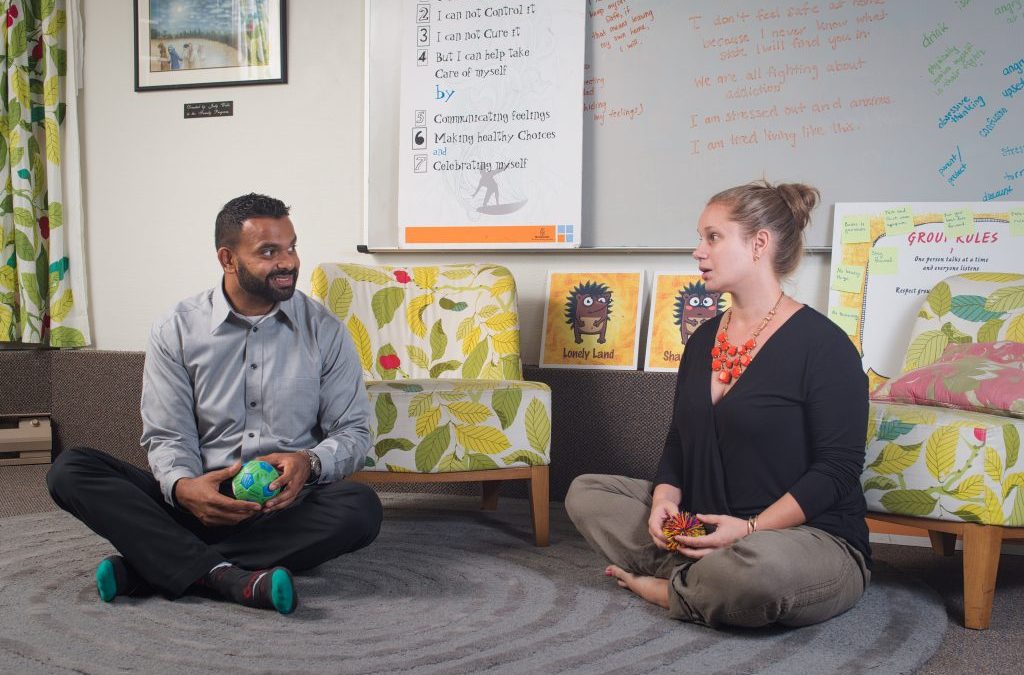Ask a Family Therapist
with Sunil Boodhai, MSW (RSW), BEd., manager of Renascent’s Family Care Programs, therapist and counsellor.
Q: I’ve been reading your column and I like many of the things you have been saying. However, I feel like your responses are a bit simplistic. It’s easy to talk about enabling as a major issue when someone is an alcoholic, but not everyone enables. My dad is an alcoholic and my mom is clearly the enabler, but my youngest sister won’t talk about my dad and his drinking, and my elder sister is trying to solve the problems by always being there for my mom. Neither of my sisters are enabling my dad but nothing is getting better. Why is this happening?
– Ted
A: Hello Ted, and thank you for writing in. Of course, you are absolutely correct that there is always more than just enabling going on in a family situation like yours. The reason we at Renascent treat addiction as a family disease is because we know that even though everyone is not always enabling, each family member tends to take on specific and often overlapping roles in order to keep the family system functioning. These roles create emotional and psychological strain because they are not genuine to the people playing them. In fact, each role exists and functions with the singular aim of keeping the family together by any means necessary, rather than addressing the real issue at hand. I’m going to outline each role here and hopefully some of this makes sense to you. Remember that no one person owns any role at all times. People can often change roles as the circumstances dictate, and sometimes one person can take on a number of roles at the same time.
1. Chief Enabler You have identified your mother as the chief enabler of your father’s addiction. She would be the person making excuses for him, and not setting acceptable boundaries for him to follow. She is hoping that by being good to him, he will see the error of his ways and stop drinking. Many of her needs remain unfulfilled and even though she is stressed and tired, her focus stays on picking up the pieces from the messes made by your father. She has not accepted the seriousness of your father’s disease, and his disease is dependant on her enabling to continue.
2. Family Hero/Perfect Child From what you’ve described, this role seems to be occupied by your elder sister. The Family Hero is usually the person picking up the slack left by the chief enabler, who leaves their usual responsibilities behind to focus on the addict. If your father has been drinking for a long time, your sister has often been your substitute mother. The Family Hero is an overachiever at school and always get good grades. They also participate in after school activities and are a shining light in the family of all that is good. The Family Hero is in constant pursuit of perfection, almost as a defence mechanism to the chaos at home. They want to be good enough to inspire the addiction to go away. They feel that if they continue to be perfect everyone will eventually notice and go back to being good parents in charge of a good family. The reality is that the Family Hero eventually crumbles under the intense pressure to keep being perfect, especially when all of their efforts go unnoticed and unrewarded. Your elder sister sounds like she is the primary supporter of your mother. They depend on each other to continue acting out their unhealthy roles while the addiction remains unaddressed.
3. Family Scapegoat This person is the opposite of the Family Hero. The Family Scapegoat usually acts out defiantly and performs poorly at school and/or work. The Scapegoat knows that they will not get much attention within the current family dynamic and is not willing to work as hard as the Family Hero to be noticed. They seem to be surrounded by problems and often become the focus of the family looking for excuses to not focus on the addiction. In fact, when the addict is not intoxicated, they often look to this person as the source of all the problems within the family. This opinion is supported by the Chief Enabler because they do not want to blame the addict for any issues for fear of relapse, and the Family Hero blames the Family Scapegoat because the Hero believes the Scapegoat should know better. The Hero is often resentful of the Scapegoat because while the Hero is high-achieving and under-appreciated, the Scapegoat is low-achieving and gets a great deal of attention, even if it is negative in nature.
4. The Lost Child This is the person in the family who fades into the background and gets no attention. They are assumed to always be okay, but are in fact painfully alone. This person shuts down their emotions and pretends to not have any needs. They do well enough at school and/or work to not put any strain on the family that is barely staying afloat. The Lost Child believes that if they make any noise by having any needs or asking for anything, they might cause the addict to act out. They often disconnect from the family and seek to have their needs met through friends and associates.
5. The Family Mascot As the name might suggest, this is the person in the family who is never able to treat any situation seriously. They do not deal with emotions well and will rely on comedy and laughter for relief. Beneath this laughter lies a great deal of insecurity and instability that is never addressed. The Mascot receives a great deal of attention due to their jovial mood and offers the family fun and humour in an otherwise dire situation.
Ted, these are the roles often adopted by various members of a family when addiction becomes a disturbing factor in the family. They function as a rather unhealthy system that is designed to prop up, enable, and manage the behaviour of the addict. However, each family member performing their role has essentially forgotten about themselves and their own true goals and desires. They are living their lives in reaction to the actions of the addict, rather than in response to their own personalities, strengths, hopes, and dreams. The system is built in such a way as to allow the addict to continue their substance use. Only when the system changes can the family regain themselves and no longer live in reaction to the addict. Family members need to begin living authentically, making the choices that are right for them and without giving any consideration to protecting the addict or anyone else in the family. I hope this explanation of common family roles has allowed you to see that beyond a single person being an enabler, there is often a complex system created out of survival, and it will hamper any possible improvement and healing for the family or the addict.
To learn more about Renascent’s various Family Care Programs or to submit a question of your own, contact Sunil at sboodhai@renascent.ca or 416-927-1202, ext. 3010.

